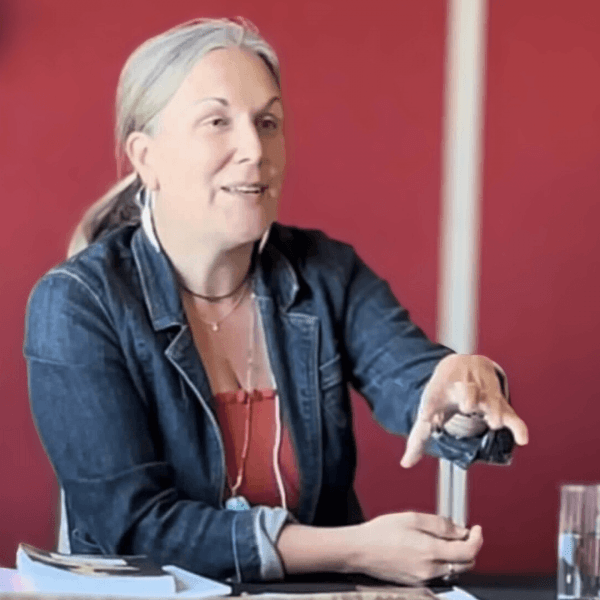From Scholarly Presentations to Transformative Teaching: Dr. Lisa Elwood-Farber Reflects on her Summer and Journey as an English Professor
Even after two decades as an English professor, Dr. Lisa Elwood-Farber says she’s still discovering herself as a teacher and a writer.
Elwood-Farber celebrates 20 years at Herkimer College this year and spent this summer sharing her work and engaging with scholars, first in late May at the American Literature Association (ALA) Annual Conference in Boston and then in July at the 2023 Summer Conversational Series, held at the home of famed author Louisa May Alcott.
At the ALA conference, she presented her essay, “Illuminations on Racial Identity in Frances Harper’s Iola Leroy, or Shadows Uplifted” with the African American Literature and Culture Society. It was an experience she described as humbling and even serendipitous. 
“It's a great conference to run into people not only in your field but maybe people that you were inspired by, let's say 25 years ago,” Elwood-Farber said. “No matter how long it has been since a student was in your classroom, some never forget you. They never forget you because I never forgot that teacher who inspired me. I actually ran into my favorite professor when I was studying for my master's degree. She’s the one who inspired me to follow my passion for African American literature. Something to remember about the education field is the profound impact of teachers and that their inspiration remains undiminished by the passage of time.”
“I presented a portion of a chapter from my dissertation, and that’s how you work a paper. You’re in this room with people who are experts on your author. Yes, I’m an expert on Francis Harper, but I wouldn’t say I’m perfect at it yet. There are people in the room who are, so they nitpick things. The questions they’re asking make you a better writer and make your paper better, and it’s great. But it can be nerve-wracking, you’re allowing yourself to be vulnerable. I didn't feel like they ripped it apart too much. So, it must've been good.”
Elwood-Farber also shared that not only do these experiences hone her craft as a writer, but they also change her approach in the classroom.
“(The ALA scholars) didn't ask too many questions and the questions they did ask were all about religion. Actually, since I wrote the dissertation, religion has changed a great deal. And I had to keep reminding people we're talking about 19th-century evangelicals, not today’s evangelicals. I'm teaching the book that I presented (at this conference) in my African American online class. So, I definitely took away the idea that I need to strengthen my discussion of her presentation of religion because if the experts in the room were confused by what I was saying, then my students are going to be.”
Later in the summer, Elwood-Farber shared her research with scholars from around the globe at the 2023 Summer Conversational Series, "‘The Angel and the Demon’ — Good and Evil in the Life and Literature of Louisa May Alcott.” There, she shared her published work, “From Fairy Tales to Vocational Tales: The Journey of Combatting Evil and Choosing Good to Achieve Self-Mastery.”
“That's why I like these teacher series, they bring in educators from around the world, from London, Czechoslovakia, and Poland. There were also two sisters who drove all the way from Texas,” she said. “It was incredible, and it just goes to show you how engaged people are with a writer in the 19th century who saw women in work as essential components together. Louisa May Alcott literally provided for her household because her father wouldn’t or didn't. I don't know how many little girls know that that was possible or that it happened all the time. Students will say, ‘Back then women didn't work.’ We've always worked. Whether we take credit for it or not is the question.”
Elwood-Farber celebrates two decades of her life’s work connecting students to stories of the past with lessons rooted in the present. For more information on the Humanities A.A. program at Herkimer College, visit Herkimer.edu/humanities.

